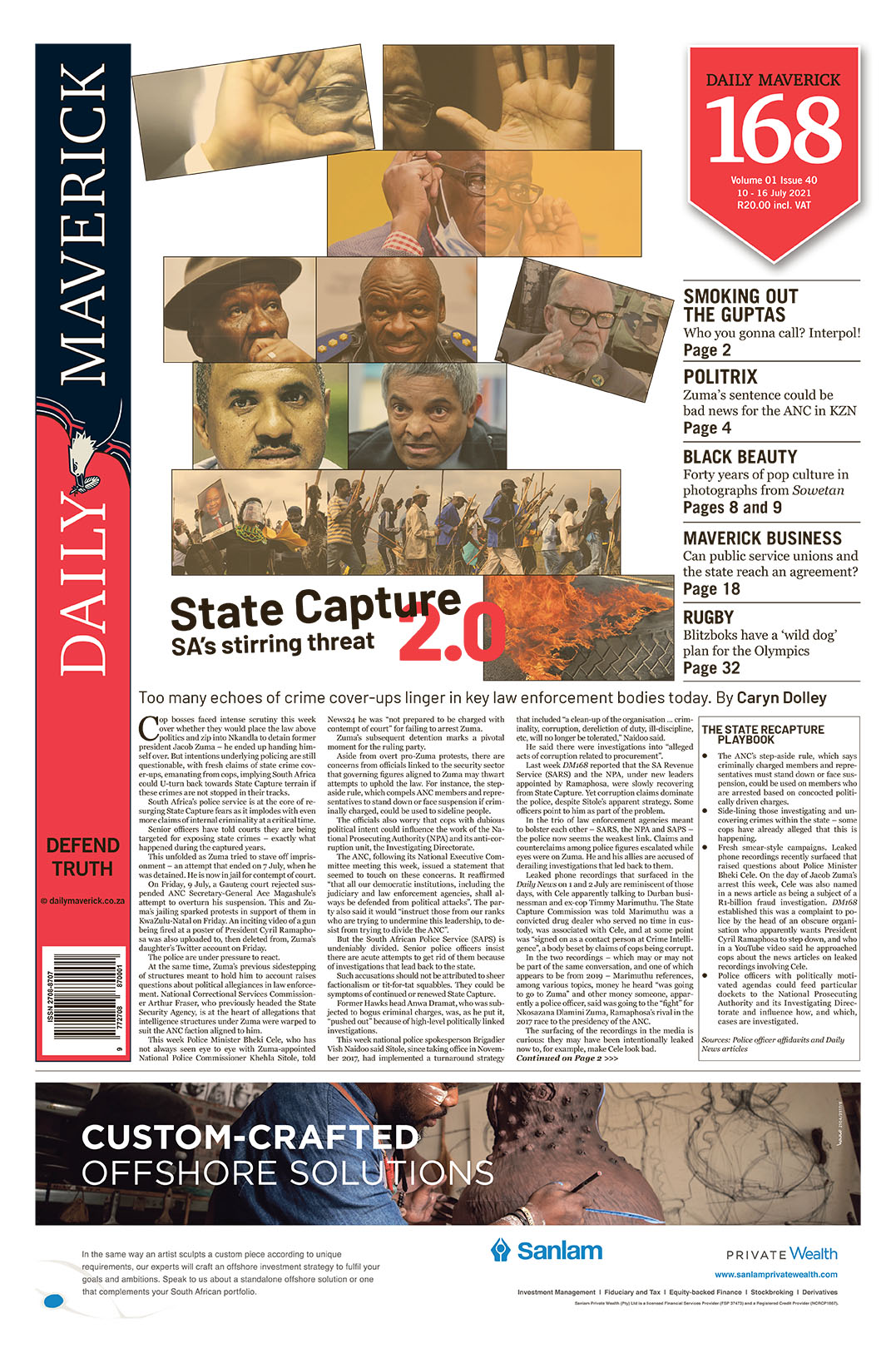First published in the Daily Maverick 168 weekly newspaper.
Police political bosses want Parliament to lay down the law so that it can limit disclosure in corruption and State Capture investigations. That’s the aim of approaching Speaker of the National Assembly Thandi Modise, explained Deputy Police Minister Cassel Mathale to the Standing Committee on Public Accounts.
Such disclosure guidelines would apply to all committees, according to the police ministry decision, and may also have to involve the justice minister. It’s a “If it doesn’t get talked about, then the problem goes away” response. It’s putting lipstick on a pig.
And it is a response unconnected to reality. Over the years, lawmakers have been rather accommodating of officialdom’s invocation of sensitivities against answering in open committee, and usually accepted written replies. Crucially, Parliament’s constitutional responsibilities mean its business is conducted in public – only excluding the public “if it is reasonable and justifiable to do so in an open and democratic society”. The Speaker must show the police the door.
This police move is straight from the securocrats’ rulebook. It’s all about hierarchies and respecting the authority of the state. It’s about sensitivities and security considerations. After all, securocrats have moved into the centre of governance over the past 16 months of the State of Disaster. The National Joint Operational and Intelligence Structure (NatJoints)– it brings together spooks, soldiers and police in a structure that does not account publicly – monitors and advises ministers in the National Coronavirus Command Council on Covid-19 lockdown restrictions.
At Nkandla, NatJoints cited security assessments and the prevention of violence and injury as the reason for not acting in the face of blatant violations of Covid-19 lockdown regulations – “undermining the authority of the state”, as NatJoints itself described it – like the ban on gatherings, mandatory masks and physical distancing.
No such considerations seem to apply to community and student protests. The South African Police Service (SAPS) water cannoned social grant applicants who did not keep their distance while queuing in Cape Town. Perhaps this categorisation of official conduct according to people’s social status is the result of the hierarchical structure that’s reinforced continually within the SAPS, fraught with its own internal politicking, and the broader security services. Constitutionally, they are security services, not as the securocrats style it, forces.
On the night of 7 July, SA watched whether police would do as the Constitutional Court on 29 June ordered: to arrest ex-president Jacob Zuma to start his 15-month jail term for contempt of court. Zuma had not handed himself over by midnight on 4 July amid a series of legal moves and political manoeuvrings. If it had been anyone else but Zuma, that person would have been in jail long ago, even if they belonged to the ANC.
Former Rustenburg mayor Matthew Wolmarans was jailed for 20 years following his 2012 conviction for the murder of whistle-blower Moss Phakoe. From prison, Wolmarans started the process to void his conviction. In June 2014, a full Bench of the Mahikeng High Court overturned the conviction. Wolmarans was released from jail and, because the slate was wiped clean once the conviction was overturned, in September 2017 he was sworn in as an ANC MP and remains in Parliament.
Some rules exist for everyone, others for some alongside a dash of special treatment.
All the while the SAPS and NatJoints drum on about respect for the authority of the state. The Constitution talks of laying “the foundations for a democratic and open society in which government is based on the will of the people and every citizen is equally protected by law”. That Zuma ultimately entered the prison system as the Constitutional Court ordered shows that everyone is equal before the law. But when the securocrats warn people against undermining the authority of the state, South Africa remains at a crossroads. DM168
This story first appeared in our weekly Daily Maverick 168 newspaper which is available for free to Pick n Pay Smart Shoppers at these Pick n Pay stores.

















 Become an Insider
Become an Insider
This request comes from the darkest corner of Government/ANC. South Africa is not at war with an external enemy. What issue are we facing that will not benefit from full disclosure of the truth! Let’s consider: the revelations at the Zondo Commission, issues in the SOE’s and other Public Sector structures, taxi wars, food security, power generation, health, transport, policing services, our dismally failing municipalities etc. I cannot think of one major issue SA is facing where full disclosure, truth and accountability will not enable and facilitate solutions. The type of power derived by “limiting disclosure” takes us directly to Red Square, with Lubyanka of the Cold War in full cry, a covert world controlled by a few powerful leaders. The issue SA faces is that the ANC’s true DNA has been exposed. It cannot manage the breadth of its constituencies – communists and democrats are poor bed fellows. An internal driving force of consensus, and pursuit of only self-regulating mechanisms, results in an ANC that does not have the courage, or the agreed desire, to have a working liberal democracy. It prefers the label, a sham, the window dressing to claim SA has such a system, as long as the reality is the decision-making power vests at Luthuli House, and thus the party, and by extension the country is run in the interest of a few individuals. A liberal democratic government needs different philosophy and policy than a liberal revolution movement in exile.